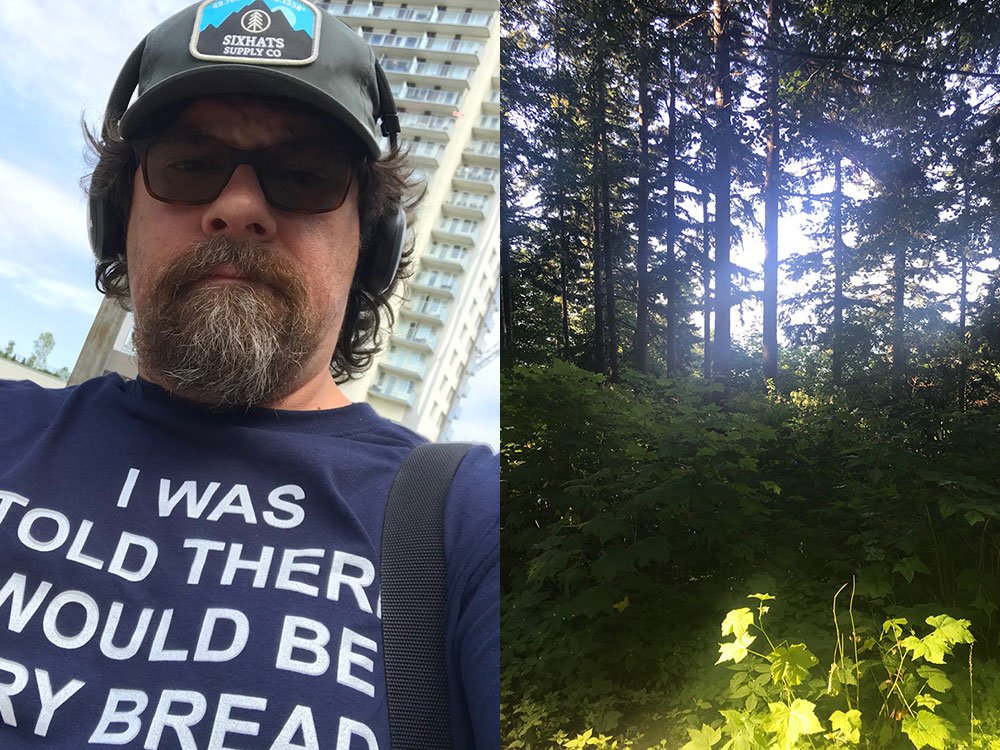[Editor’s note: This story contains information related to the residential school system and intergenerational trauma. It may be triggering to some readers.]
When Joseph Kakwinokanasum and I reach each other on the phone, we’re both looking out our windows at the bright June morning outside. Kakwinokanasum lives with his wife and cats in White Rock, B.C., where he sometimes retreats to a camper van to write and “escape the cats,” he laughs. They’re in the process of packing their home to move to Sooke.
The 53-year-old describes himself as a late bloomer, arriving at this season in his life later than some. A graduate of the Writer’s Studio at Simon Fraser University, he published an essay on life as an Indigenous writer in Resonance, a book on the writing life through Anvil Press earlier this year (come back tomorrow to read his essay in The Tyee). He’s now on the cusp of publishing his first novel, My Indian Summer, through Tidewater Press this September.
My Indian Summer is a work of fiction that is loosely based on the events of Kakwinokanasum’s childhood in northern Saskatchewan.
“One of the hardest things I had to do was show this boy coming of age,” he says. “It was a real struggle because I had no reference point. It’s something I discussed with Darrel J. McLeod at length. Darrel put it this way: we didn’t come of age, we [Indigenous children] were pulled, torn, ripped away from our childhoods. I did not have a childhood. Coming of age in a traditional sense was alien to me. Eventually after a lot of talking it out with friends, family and my editor, I figured out how to make this kid finally grow up. It’s a fiction about a kid who has to navigate life with a single parent damaged by the Indian Act.”
We talked at length about how we carry pain in everyday life, the potential we all hold for healing, and the people who guide us home. This interview has been lightly edited for clarity and brevity.
The Tyee: You wanted to be a writer from when you were a kid growing up in a small community in northern Saskatchewan. But the people around you didn't see this as a possibility for you. What was going on?
Joseph Kakwinokanasum: My mother’s reserve is in northern Saskatchewan. She moved the family from Edmonton to Dawson Creek, B.C., in the early 1970s. At birth she had two strikes against her, and when my father left my mother with six kids and no support, the count was three and zero: a woman, Native, and divorced with kids. Forty years ago, Canada was at war with Indigenous peoples. She slid into the bottle.
I really like this question. It reminded me of Maslow’s hierarchy of needs, and the fundamental requirements a human being needs to reach self-actualization. At the base of the pyramid structure: food, water, warmth and rest. Food occasionally, water yes, warmth when mom paid the bills, rest no. Many restless nights I slept with my clothes on, which leads to Maslow’s second level: safety and security, no and no. I recall feeling safe when I was alone. Don’t get me wrong: my mother didn’t do this to me. The system of governance did this to every Indigenous person.
My relations on my mother’s side are all a byproduct of the residential schools. It’s no secret what that did to them. Before mom’s dementia got too bad, she told me grandma beat her with chains, and grandpa beat her with a burlap sack of empty whisky bottles. Mom beat me with whatever she wanted. By the time I was five I knew my best hope was to make graduation, get the fuck away. Don’t look back.
You've lived through so much. You write openly about how depression, chronic pain and concussion syndrome are part of your everyday life, informed in part by early experiences of abuse. Do you have routines or daily rituals that help keep you grounded as you move through what needs moving through?
Judgement is the thief of joy. That’s something my wife and I always say to each other. She tells me I work like a dog. In bed by 8:30 p.m., up at 3 or 4 a.m., get my hot drink, dirty chai at the moment, snuggle with my cat Harry, and when the tea is brewed, I go to my office. Inside I put on noise-cancelling headphones, listen to music and write (presently Brian Eno’s "1/1" on repeat is my jam).
But it’s not every day. That’s unsustainable for a guy like me. I’d like to think I try to wake up grateful for another day, some days are harder than others, and if I get some work done, great. If I don’t, that’s fine too. Life is more trial and error: a practice, not a perfect.
What advice might you give to emerging writers who may be carrying similar life experiences to yours and potentially surfacing some of them in their work?
As an emerging writer with similar life experience potentially surfacing yourself in your work in progress, this was part of my experience: I felt a complex fear (success/failure, content/readers, family/friends, the legality for Christ’s sake). I remember that excitement, the risk, the worry, and anxiety that came with it. It’s the eye of the storm, isn’t it?
Ultimately, it’s about the memoirist, their health and well-being. Are they taking care, staying safe? I know it sounds cliché, but it’s true. Staying emotionally safe, physically, spiritually, mentally; in the Cree world we have the mental, physical, spiritual and emotional self, and like anything in life we must find a balance amongst our states of being.
When I am in that place of putting my life out there, and I feel my fears, my doubts eating away at my self-esteem, I talk to my wife, call my community of writers, my psychiatrist or my closest friends. For me this is a grounding exercise. And on that note, I want to thank my support group. I love you all.
In your writing, you talk about being white-passing, but not in a way that insulated you from racism as a child. Living as you are now as an adult, writing in the Lower Mainland, do you find that the tension of being white-passing or living with a foot in two worlds continues to be part of your everyday life?
Speaking only for myself, there has always been tension. As a half-breed there’s always risk. When I wear my Cree regalia I get mixed reactions when I don’t blend in.
The summer before COVID-19 hit I did a reading at an art show, I had my Cree regalia on, a single braid with an Eagle feather woven in. I wasn’t fancy, just a few cultural indicators that I possess a treaty card.
On my way home I stopped at our local grocery store. I stood in line and an old lady stood ahead of me and poked me in the chest. “Get out!” she said. “You don’t belong here.” You could have heard a pin drop, and none of the people, staff or otherwise did or said nothing.
People find the writing process to be many things at once: it can be simultaneously painful and joyful, exciting and mundane, tough and cathartic. What is the process like for you?
I am a storyteller first. That’s where my writing process evolved from. The result of the practice is exhausting, rewarding, exciting, gruelling, scary, but I’ve never stopped learning. Overall, it’s quite the demand regardless of the outcome. But as long as I’m happy, pass or fail, and I’m fulfilled with new wisdom for my writing practice, I can work my whole life happily, rich or poor, because writing is like martial arts to me. I practice the art because I love the art of reading and writing. And I want to tell you a good story.
Can writing be healing?
It all started in St. Paul’s Hospital. I was 27, had a nervous breakdown. That’s when I met Max, my psychiatrist. He told me to keep a written journal. I’d journalled before, but not like this. Bad dream at three in the morning: write it down. Have anxiety: write it down. Feeling angry about all the shit I had gone through: write it down.
It took years for me to get past anger. I had to relearn who and what I was. That shit takes time. Plus, I had to master cursive writing, grammar, spelling. The entire written language was so foreign to me. But I could tell a story. I knew that. So, I wrote the shit out regardless of my skills. When it was out there in a physical form, I could see it, face it, discuss it with Max. The emotional revelation was glacial in movement, and when I look back, I see a completely different person. I know now I’m not a useless, stupid fucking half-breed like I’d been led to believe. It took me 26 years to finally feel comfortable in that knowledge.
Would you like to add anything else or speak to anything that we haven't yet covered here?
For years I scrimped and saved, collected bottles and received donations from friends and loved ones so that I could attend SFU’s the Writer’s Studio. I learned so much, met so many incredible people. If you can swing it, I recommend submitting that WIP [work in progress]. That said, if you’re like me, BAS [broke as shit], TWS has scholarships you can apply for. Check them out. Moreover, for any writer it is important to maintain connections, stay in touch with your community of writers, and be kind to yourself.
Tomorrow in The Tyee, read Joseph Kakwinokanasum’s essay on being an Indigenous writer. It’s an excerpt from a 'Resonance,' a recently published essay collection from Anvil Press in Vancouver. ![]()
Read more: Indigenous, Rights + Justice, Media

















Tyee Commenting Guidelines
Comments that violate guidelines risk being deleted, and violations may result in a temporary or permanent user ban. Maintain the spirit of good conversation to stay in the discussion.
*Please note The Tyee is not a forum for spreading misinformation about COVID-19, denying its existence or minimizing its risk to public health.
Do:
Do not: